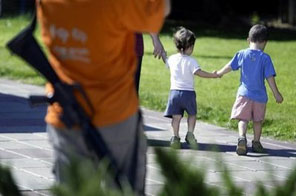Tentative Mideast peace talks begin
JERUSALEM: Palestinians and Israelis held their first indirect talks in more than a year in a tentative boost to the Middle East peace process, frozen since the Jewish state's devastating war on Gaza.
US State Department spokesman Philip Crowley confirmed to reporters in Washington that the talks had started Monday under the mediation of US Middle East envoy George Mitchell.
"As to how substantive the discussions were today, George is on his way back (to Washington). He will report to the secretary," Crowley said, referring to Secretary of State Hillary Clinton.
The talks mark the first time the Palestinians and Israelis have come together in any form since Israel launched its 22-day war on Gaza in December 2009 to stop rocket and mortar attacks from the Islamist Hamas-run territory.
The Palestinians were however angry at Israel's decision on Monday to give the go-ahead for 112 new homes to be built in a Jewish settlement in the occupied West Bank.
Israel made the move despite announcing a partial moratorium on such construction late last year, with the news breaking just as US Vice President Joe Biden was set to arrive in the region.
Israeli Environment Minister Gilad Erdan said the project in the Beitar Illit settlement near Bethlehem was an exception to the partial halt of settlement activity announced in November.
"At the end of last year, the government decided to freeze construction, but this decision provided for exceptions in cases of safety problems for infrastructure projects started before the freeze," Erdan told army radio.
The Palestinians condemned the announcement and called on the United States to intervene to halt settlement activity in the West Bank and east Jerusalem.
"This was the first item on the president's agenda," chief Palestinian negotiator Saeb Erakat said after a meeting between Mitchell and Palestinian president Mahmud Abbas in the West Bank.
"The president said this cannot stand. We cannot tolerate that each time we have discussions on peace-making the Israeli government tenders more settlements, more incursions, more provocations."
But the Palestinians grudgingly agreed to four months of US-backed indirect peace negotiations with Israel, and the State Department later gave its tacit approval to the project, saying it complied with the moratorium.
"On the one hand, it does not violate the moratorium the Israelis previously announced. On the other hand, this is the kind of thing that both sides have to be cautious about as we move ahead with these parallel talks," Crowley said.
"When you're in talks of this kind, you have to recognize the interests and perception of the other side," he said.
"And both sides should be cautious about actions that might be either perceived within the region or that might be exploited by those who want to create obstacles to further progress."
Earlier, Mitchell praised both sides for agreeing to start indirect talks, and said he would return to the region next week to discuss the "structure and scope" of the process.
"We also again encourage the parties, and all concerned, to refrain from any statements or actions which may inflame tensions or prejudice the outcome of these talks," Mitchell said.
Erakat told AFP the formal negotiation sessions had not started yet "because we're awaiting the return of Mitchell to understand the mechanism of the negotiations," adding that he expected the US envoy to return on March 16.
Israel also announced Monday that it had decided to allow UN Secretary General Ban Ki-moon and EU foreign affairs chief Catherine Ashton to enter the Gaza enclave, which is under a strict Israeli embargo.
Ban said in New York, meanwhile, that he would attend an Arab League summit in Libya this month to push forward the Middle East peace process after a planned tour of the region.
The UN chief also confirmed his attendance at a ministerial meeting of the Middle East diplomatic Quartet in Moscow on March 19 to encourage an early resumption of direct peace talks between Israel and the Palestinians.
The Quartet, which groups the European Union, the United States, Russia and the United Nations, has endorsed a roadmap for Middle East peace which calls for a viable Palestinian state living peacefully alongside a secure Israel.
But no tangible progress has been made on resolving the core issues of the status of Jerusalem, the future borders of a Palestinian state and refugees.






